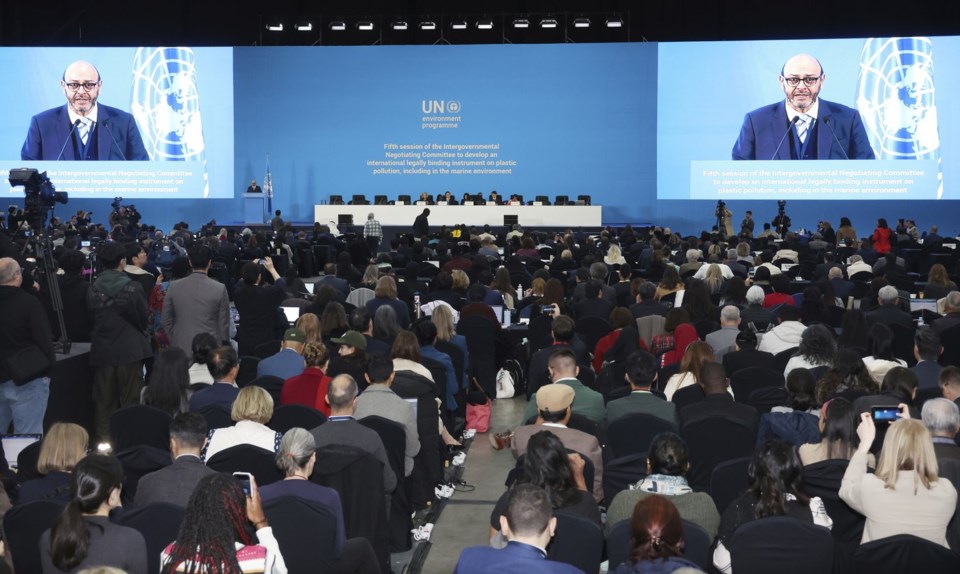OTTAWA — Canadian negotiators at the United Nations plastic pollution treaty talks in South Korea said Thursday they are working "around the clock" to finalize an agreement, though the process has been predictably difficult.
Negotiators from 177 countries are meeting in Busan for what is supposed to be the fifth and final round of negotiations to develop an international legally-binding treaty to end plastic waste by 2040.
Scientists estimate that more than 350 million tonnes of plastic are thrown out every year, with less than one-tenth ending up recycled, and more than one-fifth ending up in the environment where it is harmful to people and all forms of nature.
Canada was instrumental in bringing countries together to discuss a treaty, and hosted the last round of talks in Ottawa in April.
Officials with Environment and Climate Change Canada held a technical background briefing with media Thursday on the department's work on the negotiations, though they weren't explicit on whether a treaty could be reached by the time talks wrap up on Sunday.
Officials said there are divides between countries like Canada who want firm commitments, and others who prefer voluntary measures and a reduced scope.
The key in the final days, officials said, will be finding common ground with countries which aren't as open to the idea of a legal agreement.
The parties are working toward having consensus in the language of a treaty, as opposed to having a text adopted by majority vote. Canadian officials say having consensus is the best chance at having all countries buy in to commitments to change.
"All week has been exceedingly frustrating because, basically, the non-ambition countries took the upper hand in negotiations," said Karen Wirsig, the senior program manager on plastics with Environmental Defence — a Canadian environmental advocacy organization.
The group is one of more than 600 observer organizations attending the meetings in South Korea.
On Wednesday, Canada signed a resolution with 100 other countries to commit to future discussions on a global target to reduce plastic production to sustainable levels.
"So this is a very good move in what has otherwise been a very frustrating and slow round of negotiations," Wirsig said, adding the proposal has become the "consensus proposal" for a number of different countries.
"Knowing that Canada would have some difficulties around agreeing to a hard production target, what we need in this agreement is a commitment from countries to a reduction in production of plastic and a commitment to going to a meeting after this agreement is signed to hear from experts about what a sustainable level of plastic production is."
Environment Minister Steven Guilbeault has previously said Canada isn't opposed to setting a cap on plastic production, but that it might be too complicated a measure in order to achieve consensus among other countries.
He said jumping on board Wednesday's resolution is but one step in achieving a "high level" of ambition in any final agreement.
"Together with our international partners, we will work tirelessly to finalize a strong and effective agreement by the end of this year to end plastic pollution," Guilbeault said in a statement.
Canada began phasing in a ban on some single-use plastic items in 2022 starting with straws, grocery bags, cutlery, takeout containers, stir sticks and six-pack rings for beverage containers.
However plastic makers and chemical companies successfully argued in Federal Court that the government was too broad when it declared all plastic to be toxic, the designation Canada used in order to enact that ban. The case is currently before the Federal Court of Appeal.
In 2020, Canada produced more than 7.1 million tonnes of plastic and only five per cent of it was recycled material. Almost five million tonnes of plastic ended up as waste, with less than 10 per cent of it recycled.
While plastic can be broken down to microscopic levels, it never completely dissolves and can get into soil and water supplies.
Earlier this year Canadian researchers released a study which found microplastic in 16 different proteins, including fish, seafood, beef, pork, chicken, plant-based fish sticks and ground beef.
This report by The Canadian Press was first published Nov. 28, 2024.
Nick Murray, The Canadian Press




